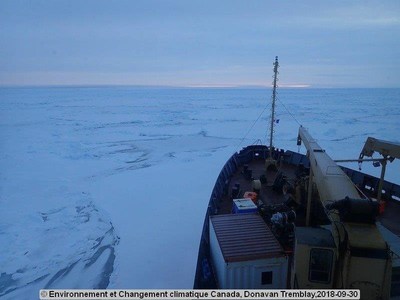MONTREAL, Nov. 19, 2018 /CNW/ - With the departure of the CCGS Louis S. St-Laurent from Arctic waters this weekend, the Canadian Coast Guard's 2018 Arctic operational season is nearing an end. Seven icebreakers were deployed to the Arctic, providing safe escorts of ships through ice-covered waters, responding to incidents including search and rescue and environmental response, supporting safe navigation, Fisheries and Oceans science missions, and training operations with partners.


Through the Oceans Protection Plan, the Government of Canada is working to improve marine safety and responsible shipping, protect Canada's marine environment, and offer new possibilities for Indigenous and coastal communities. Under the Plan, the Coast Guard extended its Arctic season, providing five additional service days this year.
As of November 5, the Marine Communications and Traffic Services (MCTS) centre in Iqaluit provided support for 166 vessels in the Northern Canada Vessel Traffic Services Zone (NORDREG). These vessels include Canadian Coast Guard ships, cargo ships, tankers, cruise ships, research vessels, bulk carriers, tugs, fishing vessels, pleasure crafts and adventurers. Extreme and challenging ice conditions this season resulted in difficult transit of some vessels in the Northwest Passage. The MCTS centre in Iqaluit will continue to serve Arctic mariners until December 21, 2018, and will reopen in May 2019. During the four month seasonal closure, Arctic vessel traffic and NORDREG operations are managed by the MCTS centre in Prescott, Ontario. This centre ensures efficient, year-round support of all marine traffic in Arctic waters.
In addition to icebreaking services, Coast Guard successfully responded to 20 search and rescue and14 environmental response incidents.
Funded by the Oceans Protection Plan, a new Inshore Rescue Boat station was opened in Rankin Inlet, which is operated by Coast Guard trained Inuit post-secondary students, closed on September 4, 2018, for the season. This Inshore Rescue Boat station responded to three search and rescue cases during its first year. The crew spent over 103 hours on-the-water, and travelled 1929 nautical miles, or 3572 kilometres. The station will reopen mid-June 2019. Click here to apply for next year's crew by November 30, 2018.
The Coast Guard's Arctic season will resume again in May 2019.
Quotes
"We are extremely proud of the work that our experienced crews and staff have accomplished yet again this season. It was a particularly challenging year due to unusual ice conditions, and the Canadian Coast Guard worked diligently to ensure the safety and security of mariners and the protection of our marine environment. We look forward to working with our partners and Indigenous communities for the upcoming 2019 Arctic season."
The Honourable Jonathan Wilkinson, Minister of Fisheries, Oceans and the Canadian Coast Guard
Quick Facts
- As of November 5, our Arctic Operations logged the following:
- 93 commercial escorts
- 23 helicopter-based ice reconnaissance missions
- 1 commercial harbour ice breakout for a vessel to dock
- 20 Arctic based emergencies requiring deployment/taskings of search and rescue assets
- As of November 7, search and rescue exercises took place with Coast Guard auxiliary units in Salluit, QC, Yellowknife, NWT, Inuvik, NWT, and Rankin Inlet, NU.
- In September, the CCGS Amundsen welcomed the Governor General of Canada, Her Excellency the Right Honourable Julie Payette on board for an oceans science mission.
- In October, the creation of a standalone Arctic Region was announced, which will be implemented in phases and has already begun.
- Environmental Response training and exercises took place in Inuvik, NWT, Yellowknife, NWT, Hay River, NWT, and Iqaluit, NU this season.
- CCGS Sir Wilfrid Laurier delivered 50 bicycles and helmets to Ulukhaktok, NWT in partnership with the Polar Bike Project.
- Royal Canadian Sea Cadets were hosted on the CCGS Louis S. St-Laurent, where they had the opportunity to undertake tasks in different vessel departments and familiarize themselves with a Fast Rescue Craft and its equipment.
- CCGS Henry Larsen welcomed Nunavut Arctic College's Environmental Technology Program students on board on November 6, 2018, for a tour and engagement session.
Associated Links
- Backgrounder – 2018 Arctic Coast Guard Season
- Canadian Coast Guard – Search and Rescue
- Environmental Response
- Canadian Coast Guard Auxiliary
- Inshore Rescue Boat Station Program
- Start Your Career With the Canadian Coast Guard
Stay Connected
- Follow the Canadian Coast Guard on Twitter, Facebook , YouTube and Instagram
- Subscribe to receive our news releases and more via RSS feeds. For more information or to subscribe, visit http://www.dfo-mpo.gc.ca/media/rss-eng.htm
SOURCE Fisheries and Oceans Central & Arctic Region

Jocelyn Lubczuk, Press Secretary, Office of the Minister of Fisheries, Oceans and the Canadian Coast Guard, 343-548-7863, [email protected]; Lauren Solski, Communications Advisor ,Fisheries, Oceans and the Canadian Coast Guard, 519-383-1909, [email protected]; Regional Media Relations, Fisheries and Oceans Canada, 204-984-4715, [email protected]

Share this article